You may be thinking to yourself, “Why would people need portable water heaters?” Most RVs come with a water heater, either with a tank (generally Suburban or Dometic/Atwood) or tankless (like Truma or Girard). But there are many tent campers and car campers out there, and there are lots of rigs like self-converted vans, schoolies, short busses, etc. without built-in water heaters.
There are also RVs on the road that don’t have working water heaters on board due to failure of the appliance or because the owner has chosen to remove it for some reason.
For all of these travelers, portable water heaters offer a good option for hot water at the ready, and fortunately, there are many on the market today.
In today’s post, we’re taking a look at five popular compact, lightweight portable water heaters that deliver on-demand hot water wherever you go. Whether you need to rinse off a pet or some sandy little feet, wash some dishes, or take a nice cleansing shower even in the wilderness, a portable water heater may be just the ticket.
Let’s check ‘em out.
- 1) What Is a Portable Water Heater?
- 2) How Does a Portable Water Heater Work?
- 3) What Should I Consider When Buying a Portable Water Heater?
- 4) How Easy/Difficult Is It to Set Up a Portable Water Heater?
-
5)
5 Portable Water Heaters for Your Traveling Pleasure
- 5.1) CAMPLUX “Enjoy Outdoor Life” 5L / 1.32 GPM Outdoor Portable Propane Tankless Water Heater
- 5.2) Camplux Pro 6L 1.58 GPM Outdoor Portable Propane Tankless Water Heater With 1.2 GPM Water Pump
- 5.3) Mr. Heater F235300 BOSS-XB13 Basecamp
- 5.4) GASLAND Outdoors BE158 1.58GPM 6L Portable Gas Water Heater
- 5.5) FORUEE Portable Propane Tankless Water Heater, 1.32GPM/5Litre Capacity, 6-IN-1 Multiple Protection
- 6) Have You Used a Portable Water Heater?
What Is a Portable Water Heater?
A portable water heater is a compact, energy-efficient unit that offers on-demand hot water on the go. They’re generally very easy to install and to take from place to place as you travel. Some portable water heaters have a tank, while others are completely tankless.
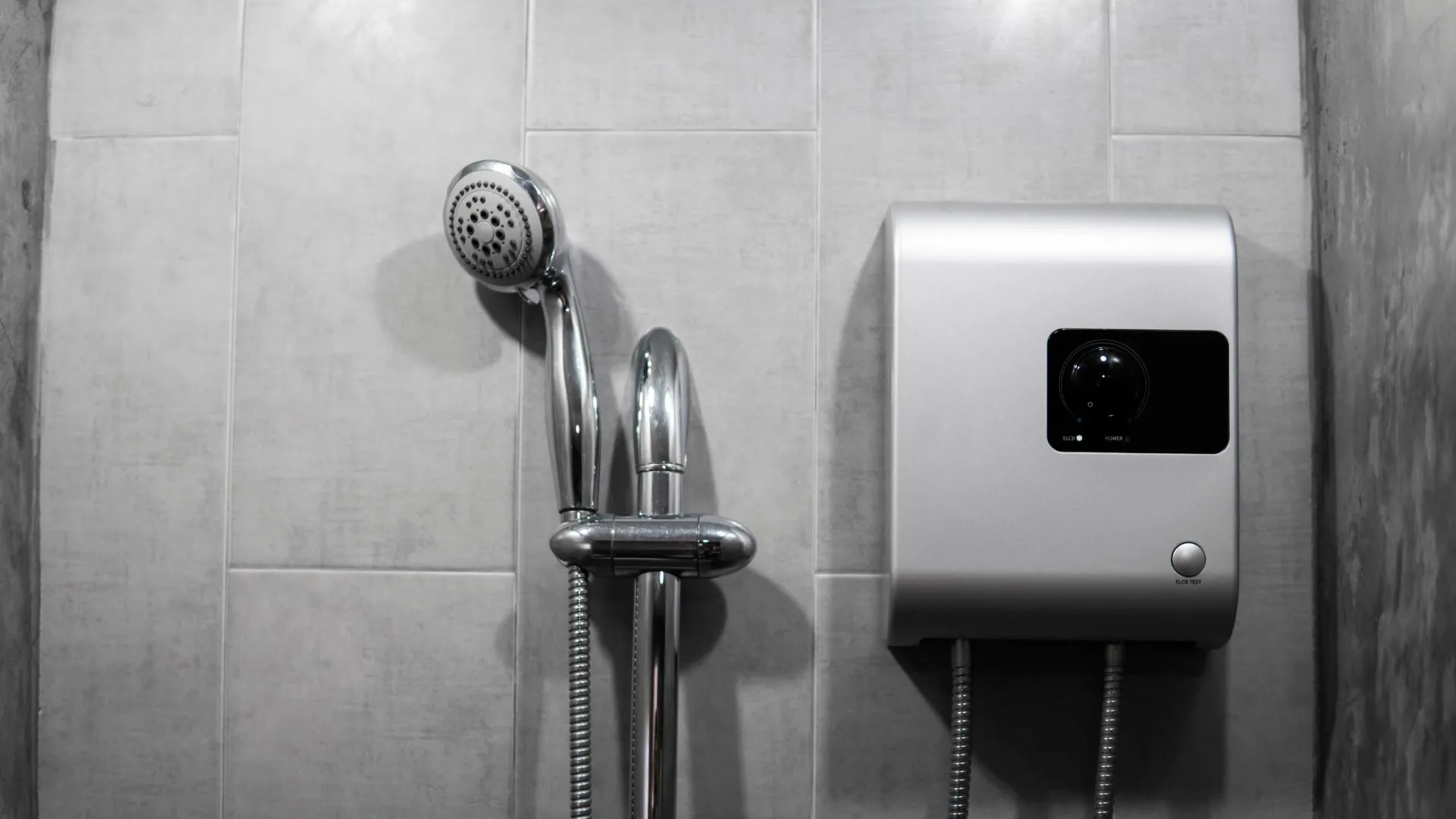
A tankless water heater delivers hot water on-demand, without a tank.
Portable water heaters use fuel to heat your water source on-demand. The heater is attached to a fuel source, usually liquid propane (LP) or natural gas, and a supply of water. When you call for hot water by turning on the hot tap, the water is heated almost instantly and is limited only by the amount of fuel and water available. Some can even be installed as a permanent water heater in an RV.
We should probably note that there are portable water heaters on the market that use electricity to heat water, but these obviously would not be ideal for campers. In order to provide sufficient (and fast) heating, these heaters require connection to a 240V power supply… not something you’re likely to find out in the woods!
How Does a Portable Water Heater Work?
Quality portable water heaters generally have a temperature sensor, a fan, a heat exchanger, and a power source. When hot water is called for, the sensor activates the unit’s power source, and the burner ignites. As the water passes through the pipes in the system, it’s heated within seconds. When the water is shut off by the user, the burner generally shuts off automatically.
Some portable water heaters can heat bitter cold water to 100 ℉ in around 5 seconds or so. They run efficiently and don’t require a pilot light to produce a steady stream of hot water on demand.
Again, the amount of hot water produced by a portable water heater is limited by the amount of both water and fuel you have available.
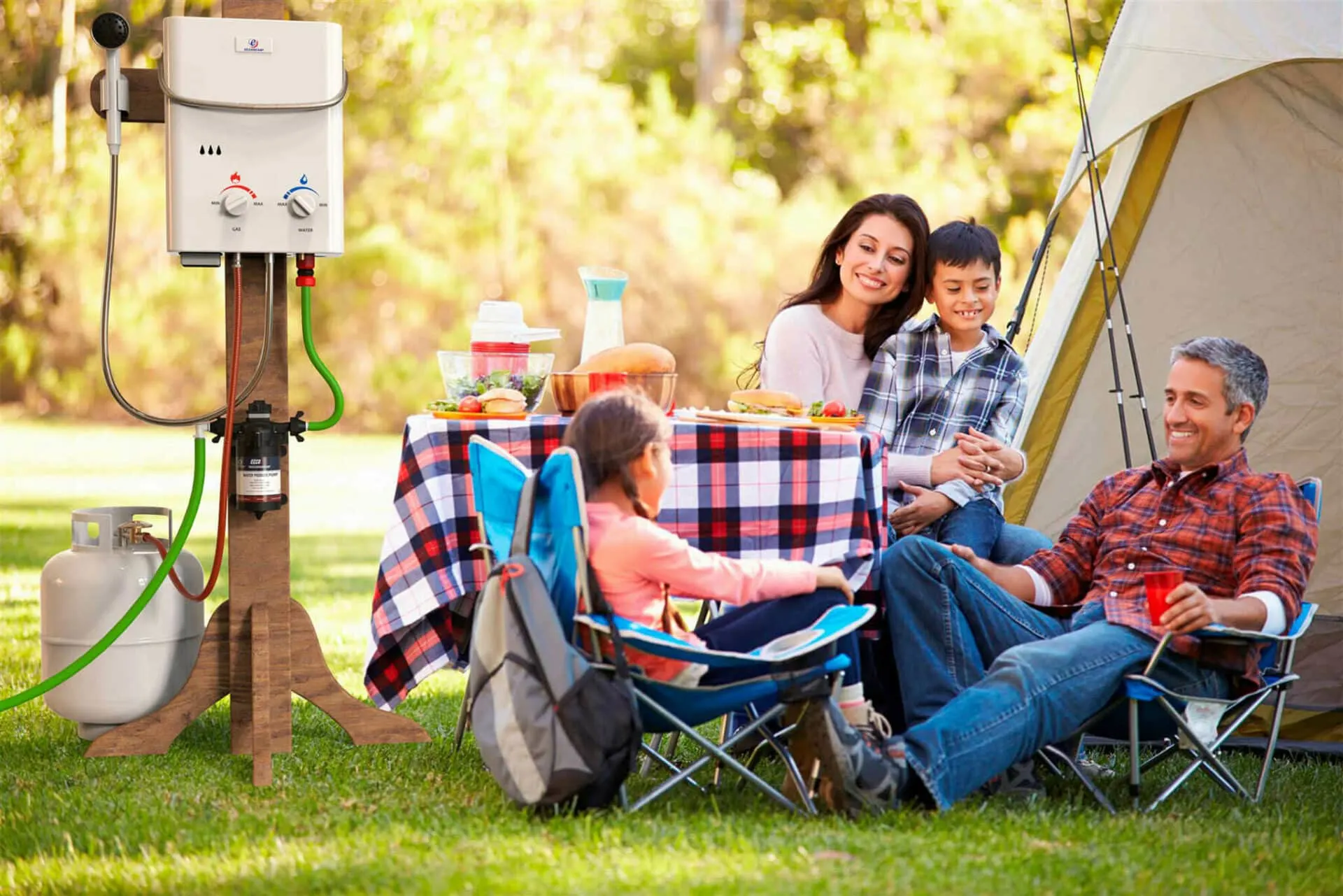
With a portable tankless water heater, the only limitations on your hot water are the amount of water and propane you have access to. Here you see a portable tankless water heater connected to a propane tank, with a water pump added to regulate water delivery. (Photo credit: Ecotemp)
What Should I Consider When Buying a Portable Water Heater?
There are a number of considerations to bear in mind when shopping for a portable water heater. Let’s take a look at each of them in brief detail.
Energy Source
What will be the source of the energy required to heat your water?
In truth, this isn’t a consideration you’ll need to spend much time mulling over, because most portable water heaters use propane as their primary source of energy.
But this does, of course, require you to carry a portable propane tank with you. If you don’t already have one on board your rig, you’ll need to buy a small propane tank (for example, a 20lb tank which is roughly 5 gallons of propane) to connect to the water heater to generate heat. (For reference, a 20lb propane tank should provide you with around 18 hours of “normal” showering in total. If you’ve got teenagers and an unlimited water source, you’re on your own. ????)
While there are on-demand water heaters that use natural gas as their fuel source, these are designed to be used in static homes/buildings as they require a connection to a supply of natural gas which isn’t available in portable tanks like propane is.
As we mentioned above, some portable water heaters exclusively use electricity to heat the water, but this would be far from ideal for campers who have a limited source of electric power. Electric tankless water heaters require a strong electric current and can draw anywhere from 47 amps to 167 amps. They also operate at 240V AC! So, as you can see, this is not ideal in any type of camping situation, and not even possible in most mobile situations.
While your best, and most likely, source of fuel for a portable water heater will be propane, you need to be aware that some portable propane water heaters use some electricity, mainly to power a digital display. This electricity may come in the form of a lithium battery or a couple of replaceable D cell batteries (or similar).
So, when you’re shopping, you may see reference to a propane water heater as being “battery-powered”. This doesn’t mean you’ll be using your RV batteries to heat the water. It simply means that your water heater has some electrically-operated components (likely to include ignition) driven by an internal battery or two.
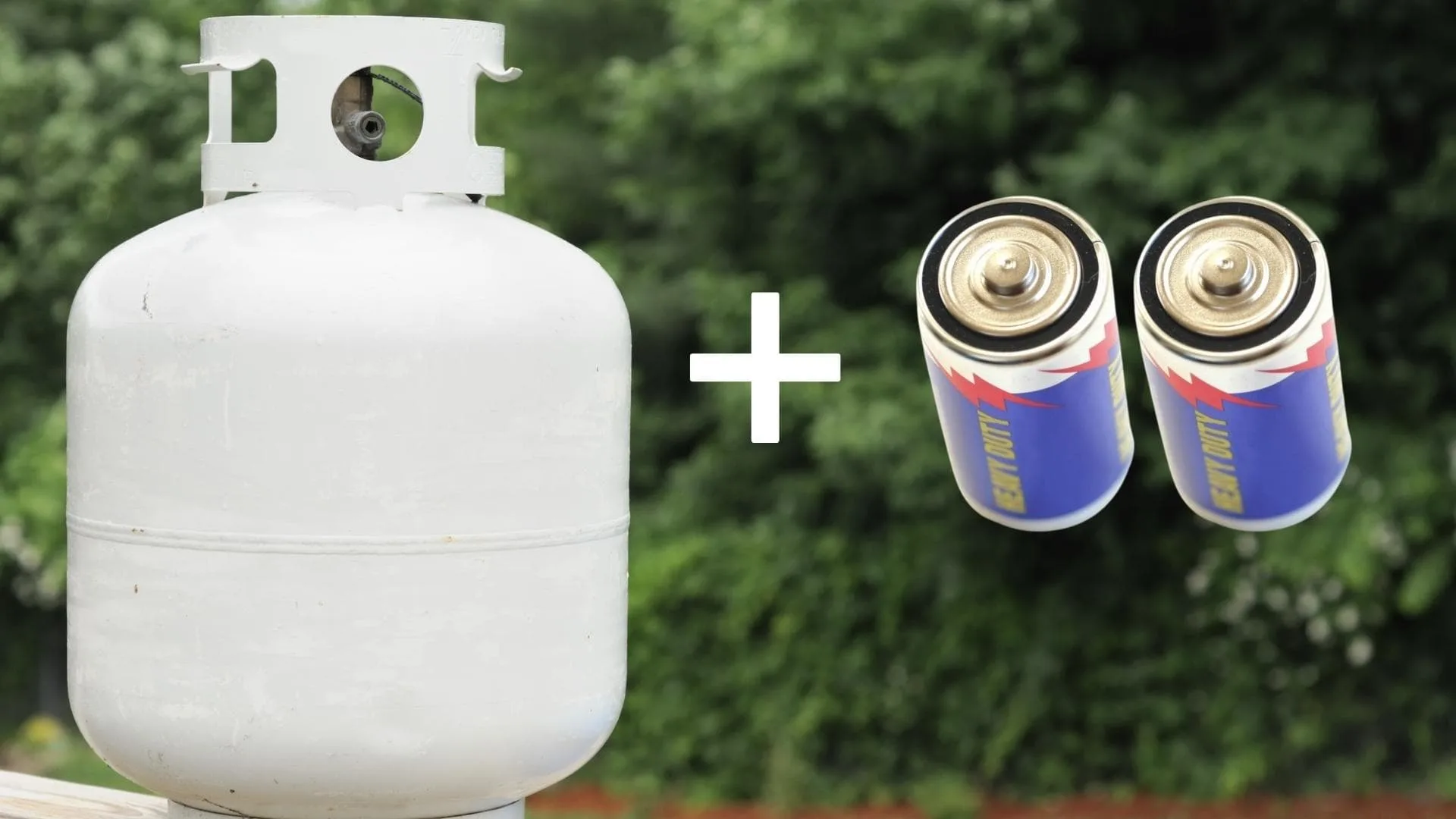
Most portable water heaters are tankless and fueled by propane. They often require a couple of D-cell batteries for ignition and the operation of any digital controls. So, if you see the term “battery operated” related to a portable water heater, this is likely a reference to the small batteries that power the ignition and digital display control.
Tank or Tankless
This one involves a real decision. You can choose a portable water heater that either uses a tank or is tankless. Most campers opt for tankless water heaters not only for the convenience of not having to haul a tank around but also (and especially) because tankless water heaters produce as much hot water as desired, limited only by the amount of water you have access to and the amount of propane you have in your propane tank.
A portable water heater with a tank is essentially a shower in a box. These are generally equipped with a little water pump, and a faucet and showerhead are included. Once put together for showering, everything is contained in the box, including the water.
However, a water heater that uses a tank heats only the amount of water the built-in tank can hold. So while they may be small, self-contained, and extremely portable, the size of that small tank will determine the amount of hot water you have available at any given time.
So, while a little 2-gallon water tank might be fine for general cleaning, quickly rinsing off, and doing some dishes at your campsite, you’ll probably need at least a 10-gallon tank for showering. What you may find on the “pro” side of a portable water heater with a tank is that depending on the heater you choose, it might be capable of giving you a stronger water flow rate than a tankless one. More on that in a minute.
Size/Weight
Your choice regarding the size and weight of your portable heating unit will likely depend on your camping situation. In other words, how much size and weight can you carry?
For some users, this feature is critical as they have little space to dedicate to this equipment. For example, there are backpackers who carry small water heaters to their campsite and use them with the water from a lake or stream on their adventures.
So, if you’ve gotta walk into your campsite, or if you have very little space in a van or car camping setup, this feature will definitely be one to pay close attention to.
For the most part, most campers tend to buy a 20-22 pound portable water heater.
BTU Rating
When shopping for a portable water heater, you’ll want to be sure to take note of each unit’s BTU rating. “BTU” stands for British Thermal Unit, a measurement that allows for the calculation of the speed and efficiency of the heating process.
The higher the BTU rating of the water heater you choose, the quicker (and better) it will heat your water. This is important to keep in mind, as you’ll see many reviews from people who’ve disregarded BTU rating when shopping, and then complain because the water isn’t heated anywhere near instantly and/or doesn’t reach or maintain the desired temperature for showering.
This can be especially important if the source of water you plan to heat happens to be extremely cold. On-demand water heaters only have a limited time to raise the temperature of the water flowing through them. If the water is almost freezing, a water heater with a higher BTU output will be better able to bring the final temperature of the heated water to a more comfortable range than a smaller, less powerful heater.
So, be sure to compare BTU ratings when researching portable water heaters.
Rate of Flow
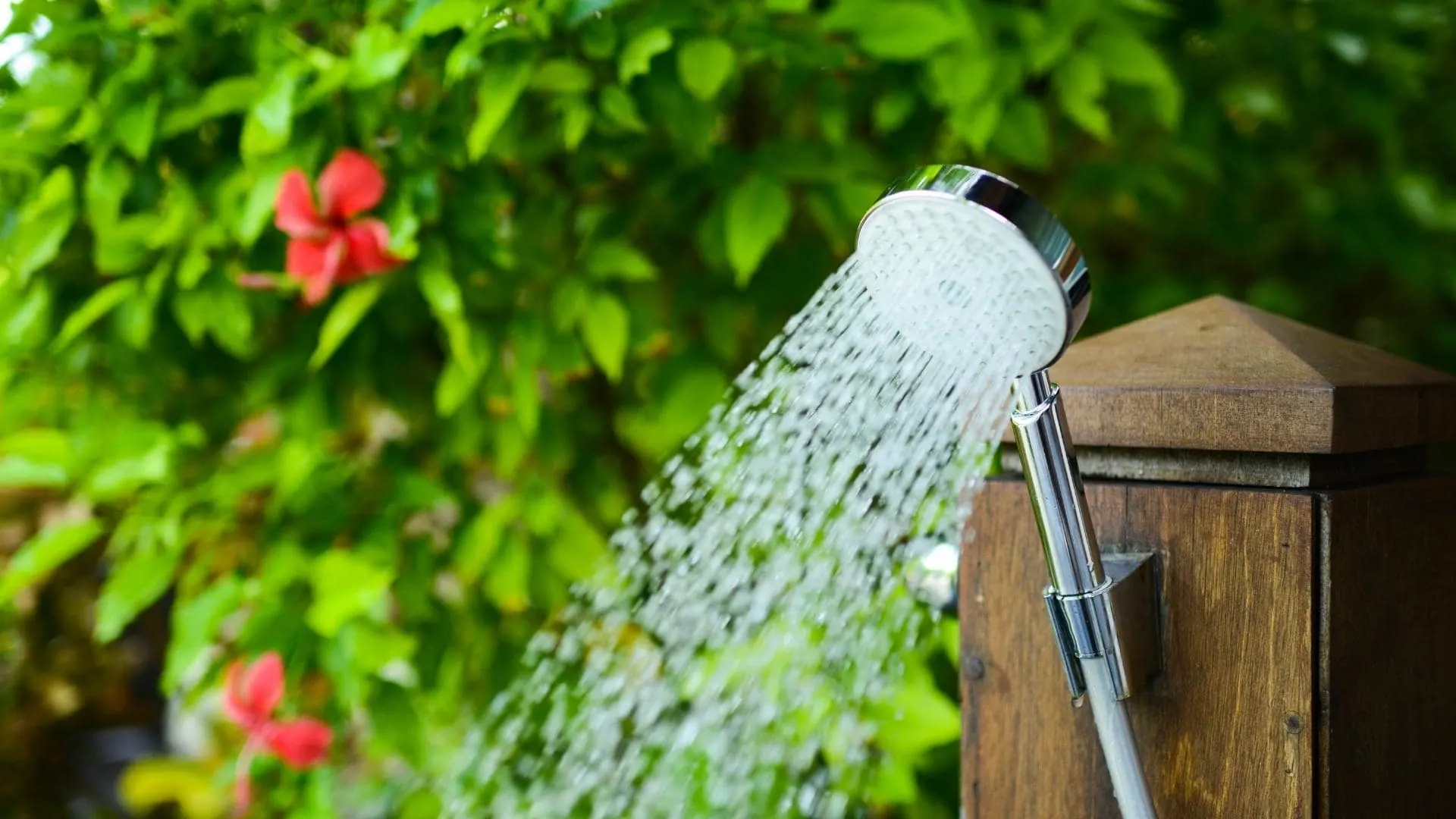
It’s important to pay attention to BTU rating and flow rate if you’re planning to use your portable water heater for showering. Otherwise, you may be disappointed in both heating efficiency and the power of the water flow.
Flow rate refers to the number of gallons a water heater can deliver in one minute. You may see this referred to as GPM (gallons per minute). You’ll also notice that portable water heaters with higher BTU ratings also tend to have a higher flow rate.
These are good features to note, particularly for those who want to use their portable water heaters for showering. A higher BTU output of the heater will allow for higher pressure and a higher flow rate. GPM should be noted on the unit as well, so calculating the pressure, efficiency, and flow rate of any given unit should be relatively easy.
Included Accessories
In order to use a tankless water heater to shower, wash dishes, and rinse off your children and pets, you’ll need a few accessories. If those accessories don’t come with your portable water heater, you’ll need to buy them separately, so look for a unit that comes fully accessorized if possible.
Accessories should include a hose and a showerhead, as well as a propane/gas regulator.
If you’re not familiar with the purpose of a regulator, we welcome you to check out our post on RV propane regulators.
Other accessories that you may need to provide if they’re not included with your portable water heater include batteries, installation kits, and of course a propane tank.
Elevation Use
Be aware that if you’re someone who camps at high altitudes, you’ll want to pay attention to some fine print in this regard when buying a portable water heater. Most portable water heaters aren’t designed to work well at elevations greater than 2,000 feet above sea level. This is due to the fact that the efficiency of the system (particularly of the combustion of the propane to generate heat) decreases at higher altitudes, as the oxygen content of the air decreases.
So, if you travel to higher elevations and wish to use your portable water heater in those locations, then be sure to check the unit’s operating elevation to ensure that the heater you’re considering will serve you at higher elevations.
How Easy/Difficult Is It to Set Up a Portable Water Heater?
Portable water heaters are very easy to set up, however, it’s very important to follow the manufacturer’s instructions WITHOUT EXCEPTION. The biggest downside to portable water heaters is that an improper or haphazard setup could result in a tragedy that could cause devastating injuries and even fatalities.
For example, many manufacturers note that you must be careful not to over-tighten the connections so as to avoid creating any airflow pockets. You may also be instructed to use PTFE tape on the gas connectors to prevent dangerous gas leaks.
However, you may be instructed not to use any tape between the gas regulator and the gas inlet pipe, as doing so could cause a fire. You should always test for gas leaks before using the unit.
Never cut corners or ignore instructions when setting up a portable propane water heater (or any other appliance that involves LP gas for that matter).
Now that we’ve prepared you to be cautious, setup is actually fairly easy. With a tankless water heater, you’ll simply connect one end of the gas supply hose to the unit and the other end to your propane tank. (This end of the hose should include the propane regulator.) You’ll then connect one side of the water supply hose to the input for the unit and the other end to your source of water. And, finally, attach the hose for your showerhead/wand to the output of the heater.
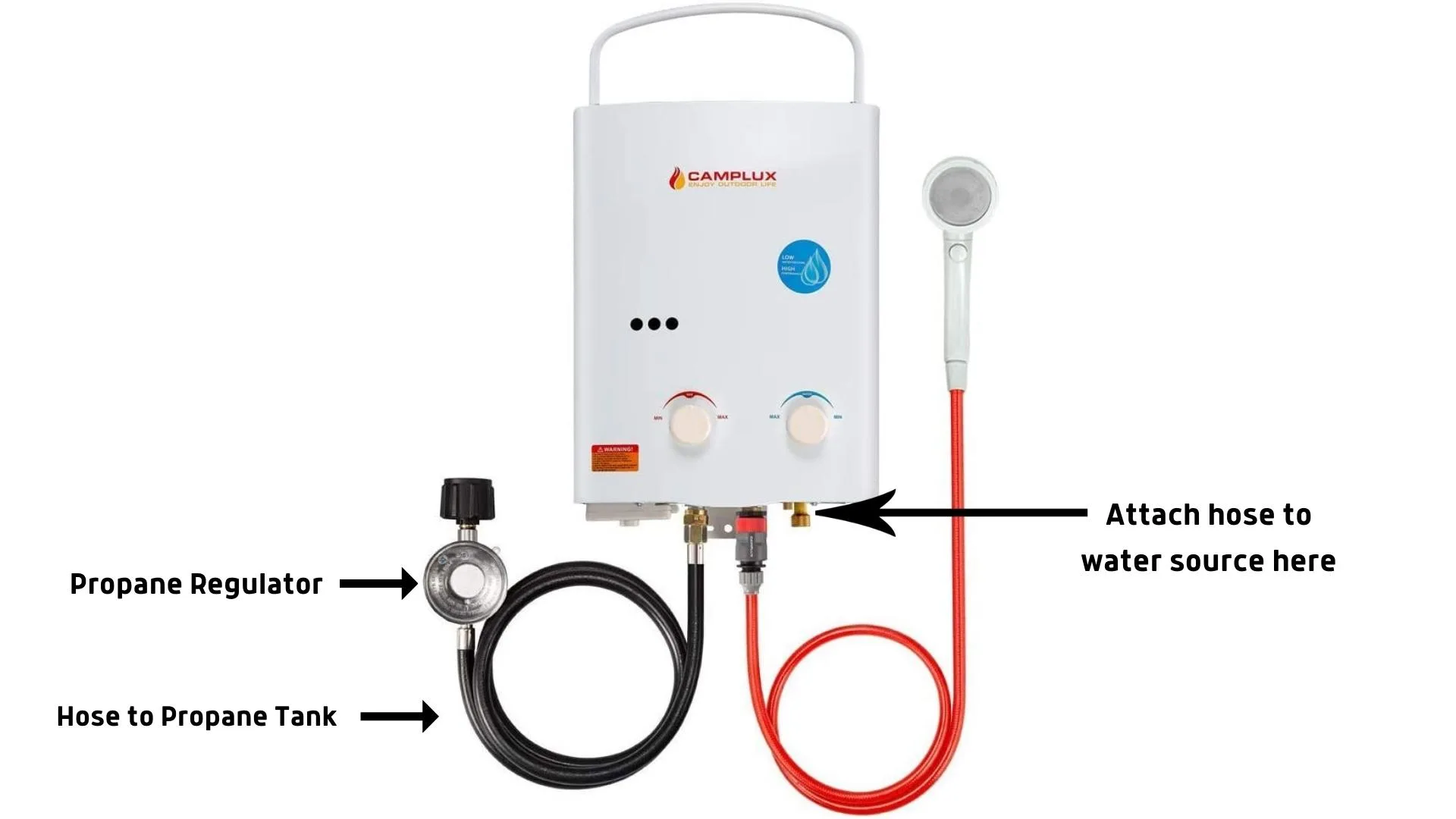
Installation of a portable water heater is quite simple. The most important aspect of the installation is the care required where the propane connection is concerned. (Photo credit for original, unlabeled photo: Camplux)
All-in-one portable water heaters with a tank are plug-and-play, very safe, and relatively easy to carry around.
Let’s take a closer look at some options for portable water heaters:
5 Portable Water Heaters for Your Traveling Pleasure
The following five portable water heaters offer either a tankless or “shower-in-a-box” (meaning it has a tank) experience. Again, note the BTU and GPM of these units, as well as the size and weight, bearing in mind the amount of space you have available in your rig.
CAMPLUX “Enjoy Outdoor Life” 5L / 1.32 GPM Outdoor Portable Propane Tankless Water Heater
This tankless water heater is fueled by propane and includes a showerhead with a 5-foot hose, a propane regulator (CSA-approved), and an installation pack.
Ignition is noted to be accomplished by 2 D-cell batteries (not included).
One of the reasons for this unit’s popularity just may be its minimal weight of 10 pounds. Its compact size doesn’t require much space to store or use, and it’s very easy to carry.
This unit has a flame failure device, anti-freezing protection, and a safety shut-off in the event of oxygen depletion (to protect you from any danger associated with depleted oxygen if you’re using it in an area without sufficient fresh air).
The maximum rise in temperature (i.e. how much above the temperature of the incoming supply of water) is 114.8℉(46℃), while the minimum temperature rise is 46.4℉(8℃). The maximum power output is rated as 28,000 BTU/hour.
This unit is not recommended for use at elevations above 2,000 feet.
- Lightweight, Compact & Portable Design: The 10 pounds lightweight portable water heater's folding handle keeps it out of the way and enables easy...
- Flow Rate & Temperature Specification: The temperature raise is 114.8℉ (46℃) at its highest point and 46.4℉ (8℃) is at its lowest point of...
Camplux Pro 6L 1.58 GPM Outdoor Portable Propane Tankless Water Heater With 1.2 GPM Water Pump
This 6L 1.58 GPM portable tankless water heater, also from Camplux, weighs 15 pounds and comes with its own 1.2 GPM water pump, allowing you to use a non-pressurized source of water. The unit is 17.32 long x 11.61 wide x 4.33 inches.
The maximum power output on this unit is 41,000 BTU/hour.
In addition to the 1.2 GPM water pump, the Camplux Pro includes a showerhead with a pedestal, a 5-foot shower hose, a 5-foot CSA-approved gas hose and regulator, and all the necessary connectors as well as an accessories package for hanging the unit, and an instruction manual.
This unit is also powered (ignition and display) by two D-cell batteries which are not included.
- 𝐄𝐚𝐬𝐲 𝐈𝐧𝐬𝐭𝐚𝐥𝐥𝐚𝐭𝐢𝐨𝐧 & 𝐔𝐬𝐞 - It only takes you a few minutes to get 1.58 gallons per minute of...
- 𝟏.𝟐 𝐆𝐏𝐌 𝐏𝐮𝐦𝐩 𝐊𝐢𝐭 𝐀𝐯𝐚𝐢𝐥𝐚𝐛𝐥𝐞 - The water pump is powered by 12V DC, you can get 2 pcs...
Mr. Heater F235300 BOSS-XB13 Basecamp
The Mr. Heater Basecamp is an example of a portable propane water heater with a tank. It has anti-scald protection and a tip-over shut-off switch for safety.
This 12,000 BTU all-in-one unit is 13” x 8” x 12” and weighs 14 pounds (when empty).
A couple of notes:
- First, Amazon documentation notes this unit as being “battery-operated”. What that means is that the required 6 D-cell batteries power the included pump and the ignition of the unit. The D-cell batteries are not included with the unit.
- Second, we should probably note that 15% of Amazon reviewers were highly dissatisfied with this unit giving it a 1-star rating. Looking through those reviews, many people were disappointed that the unit was very fickle and the water produced was (in some cases) barely lukewarm… though that could be due to improper setup or use.
The marketing documentation notes that the 12,000 BTUs increase water temperature up to 35-degrees above the source temp (and the source temperature must be below 60-degrees). If you’re using water that’s at 50-degrees to start, you’ll be taking a shower in water that’s 85-degrees at most. Studies show that the average water temperature for most showers is somewhere right around 105-degrees F. This means that 80-85 degree water might offer a disappointing shower for someone who is unaware of this limitation.
Note that Mr. Heater also produces a couple of other sizes of portable water heaters, all three with tanks. The other two units, (the Boss XW-18 and the Boss XCW-20), are 18,000 BTU units and raise the water temperature up to 42-degrees higher than the temperature of the incoming water supply.
- Portable battery operated propane shower system
- 12,000 BTUs increase water temperature up to 35-degrees above source (source temperature must be below 60-degrees)
GASLAND Outdoors BE158 1.58GPM 6L Portable Gas Water Heater
This ANSI- and CSA-approved tankless portable water heater is a 41,000 BTU/hour unit capable of generating 1.58 gallons per minute. Both temperature and water flow are fully adjustable.
This unit is 11.8 x 6.1 x 17.3 inches and weighs 15.42 pounds. Ignition and digital display are powered by 2 D-cell batteries, (not included). It’s equipped with a flame failure device, anti-freezing protection, and overheating protection over 167°F.
- 𝟭.𝟱𝟴𝗚𝗣𝗠/𝟲𝗟 𝗣𝗿𝗼𝗽𝗮𝗻𝗲 𝗪𝗮𝘁𝗲𝗿 𝗛𝗲𝗮𝘁𝗲𝗿 - Maximum power output 41,000BTU/Hr.The...
- 𝗚𝗼𝗼𝗱 𝗳𝗼𝗿 𝗢𝗳𝗳-𝘁𝗵𝗲-𝗚𝗿𝗶𝗱 - Runs on a standard 20 lb. liquid propane tank and is equipped with an...
FORUEE Portable Propane Tankless Water Heater, 1.32GPM/5Litre Capacity, 6-IN-1 Multiple Protection
This tankless water heater weighs 14.13 lbs and is compact at 11.5 x 4.7 x 13.4 inches. Ignited by 2 D-cell batteries (not included), this propane-fueled water heater comes with a wrench, CSA-approved gas regulator, 3-stage showerhead, extended stainless steel hose, dust cover, handle, garden hose connectors, PTFE tape, and appropriate fittings.
Performance is noted to be .66 to 1.8GPM and 34,000 BTU/hour.
Among its 6-in-1 safety functions is oxygen depletion safety shut-off protection. This means that if the device should detect a high concentration of carbon monoxide or a lack of oxygen in the combustion chamber, the device would be triggered to immediately shut off the power supply, shut down the solenoid valve, and stop the escape of propane gas.
Other safety features include a safety-flame failure device, anti-freezing protection, and overheating protection. This unit has an anti-freezing drain plug to release residual water to avoid freezing in cold areas as well as for long-term periods of no use, or for maintenance purposes.
Have You Used a Portable Water Heater?
If you’ve used a portable water heater, shoot us a comment and let us know about your experience. We’d be interested to know how and where you used the unit, and how well it performed for you.
Regardless of the type of water heater you have, you may have an issue at some point and need help so you can enjoy a hot shower! Check out these posts:
- RV Shower Getting Cold? RV Water Heater Troubleshooting Tips
- No Hot Water in Your RV? Try This Simple Fix First!
Geek Out with Us Every Week
Join our newsletter to learn about all things RV-related. Every week we offer free tips, tricks, product reviews, and more to our online community of RVers. So, whether this is your first time on the road or you’re a seasoned expert, we’d love for you to geek out with us!







Bruce
Monday 23rd of May 2022
I have a Zodi Hot Tap which works off a 1lb propane cylinder which I use for showering when tent car camping in campgrounds without showers. I fill a 5 gallon bucket, put the pump hose in, turn the pump on to first get the water flowing through the heater, then turn the heater on. If you turn the heater on first and then the water pump, you will get seriously scalded, I learned this the hard way. You'll also go through 5 gallons of water pretty quickly. Depending on the weather temperature, it also can be pretty uncomfortable showering outside and the tall popup shelter can blow around quite a bit in the wind so I now use my hunting ground blind and sit inside on a folding chair. Since there is no floor (which is a plus and a minus) I put my feet in dishwashing tub to keep them from getting muddy. Overall, it sees pretty limited use.
Leslie P
Monday 23rd of May 2022
Thank you for all the great content. Always enjoy your newsletter. I am in search of a solar water system to be used outside on my recreational property. Any ideas ?